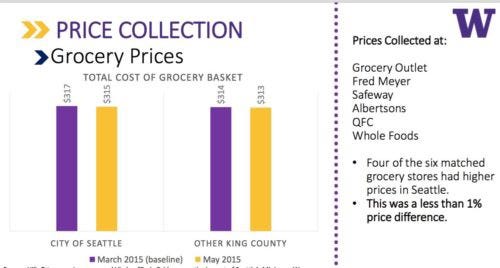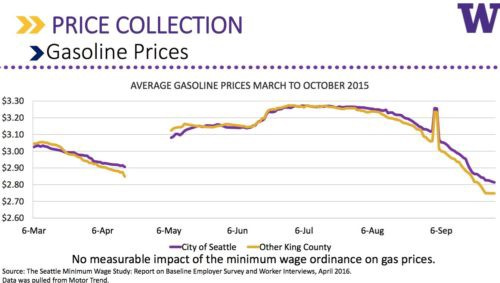$15 Minimum Wage’s Effects on Seattle Economy are Negligible
Now that the great Soviet revolution in Seattle has seen its power consolidated by the election of a socialist City Council member and the implementation of a $15 minimum wage, mainstream observers have been content to sit back and await the inevitable economic collapse of the city. Some of the first available data is in from the University of Washington, and the results are… not economically collapse-y.
Seattle has so far avoided inflation related to the wage increase. Prices are remaining static in the city.
[T]he UW study is clear- prices have not substantially risen in Seattle since the minimum wage law came into effect two years ago. The law provides for a slow phasing in of the increase. Workers in Seattle saw the minimum wage rise to $13 an hour this January, it will reach $15 citywide by January of 2017.
Even with the rise in wages in the city of Seattle, prices have not risen in the city. The UW study found such negligible increases in grocery stores between Seattle and the rest of King County as to be indistinguishable.
The researchers found that costs of grocery store food, gas prices, rents, and retail prices in Seattle hadn’t increased any faster than in the rest of King County.
Further, rent in the city fell in comparison with some of its countywide neighbors.
[H]ow could this be? The answer might be as simple as Seattle being only one municipality in a populous county- while the Emerald City has the largest population center, King County is a large and diverse region. Therefore, prices need to reflect the buying power of the surrounding communities, not just those whose minimum wage is higher than the rest of the state’s.
Or it could be gas prices. The decline in nationwide fuel costs might be creating a false sense of security in Seattle by reducing transportation costs and artificially deflating the cost of product before it reaches market, further complicating accurate readings of retail costs and profits.
What’s more likely, though, is the first option. Seattle is adapting to a slightly less unbalanced economy in favor of the rich and finding ways to do that that don’t require passing costs down to consumers or cutting wages. If they can do it, anyone can.
The data is clear- the forecast of hyper-inflation and economic collapse as a result of the minimum wage increase in Seattle has been decisively proven wrong.





